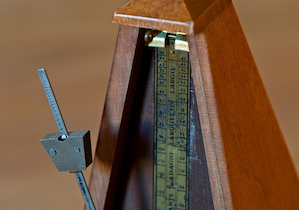
Image by James Lee
Stories about Beethoven's strange tempo markings go back to the time of the composer, and recently the subject came to attention again. Apparently, when playing Beethoven, many musicians completely disregard the tempo markings on his original sheet music because they are extremely fast.
According to a paper published in the American Mathematical Society, 66 of 135 prominent musicians surveyed regard the markings as "absurdly fast and thus possibly wrong." The reason?
Beethoven got his metronome from a man named Johann Nepomuk Mälzel, who was something of a mechanical wizard. He made little musical automatons, tiny robots that could play music that the public very much enjoyed. Beethoven and Mälzel connected when Beethoven was looking for help in dealing with his hearing loss, and Mälzel made him several ear trumpets. The two most likely also discussed the issue of timekeeping, as Mälzel had been working on metronomes.Mälzel went on to invent more automatons, like the famous Mechanical Turk who played chess, but he continued his work on metronomes, as well. In 1812 he heard about an invention by Dietrich Winkel, who had created a double pendulum device. Mälzel hurried to Amsterdam to meet Winkel and realized that his rival had a metronome far superior to his own. He tried to buy the invention, but Winkel refused. So Mälzel simply made a copy and patented it in London, Paris, and Vienna.
Around the same time, Mälzel was trying to swindle Beethoven. There was a later debate between them over who owned the rights to a piece of music Mälzel suggested and Beethoven composed. They went to court over it. Historians think that, around 1815, Mälzel might have sent Beethoven a metronome as a sign of forgiveness and peace, and by 1817 Beethoven certainly had one of Mälzel’s devices — the one he used to write all the crazily timed pieces.
That's one view, there are many others. But no amount of reading about the subject can provide what Radio Lab cooked up last week, with excerpts from the Fifth and Third symphonies at speeds varying from today's standard BPM (beats per minute) to the much faster tempos Beethoven might have wanted ... if his metronome was working, or his copyist didn't mess up, or ...
For varying tempos of the Fifth Symphony, here's a sample list:
88 BPM: Arthur Nikisch conducting the Berlin Philharmonic
102-4 BPM: Glenn Gould
105 BPM: Arturo Toscanini conducting the NBC Symphony Orchestra
109 BPM: John Eliot Gardiner with the Orchestre Révolutionnaire et Romantique
(And the one that seemed to land exactly on Beethoven's chosen tempo of 108 PM was Walter Murphy's Fifth of Beethoven, from the movie Saturday Night Fever.)

